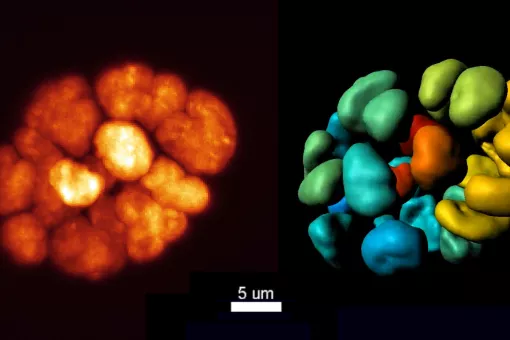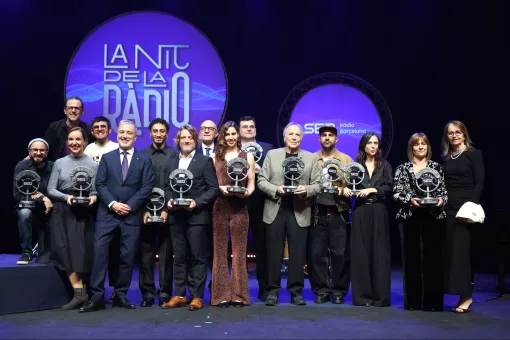Images
Modesto Orozco receives the Bruker Prize and Pau Bernadó the I Prize for Young Investigators.
The two annual prizes awarded by the Spanish Biophysics Society (acronym SBE in Spanish) in recognition of work on biophysics done by scientists in Spain have fallen on researchers at the Institute for Research in Biomedicine (IRB Barcelona). Modesto Orozco, senior professor of biochemistry at the University of Barcelona and international expert in the computational modelling of biological systems has been presented the VII Bruker Prize-SBE, an award shared with José Luis Rodríguez Arrondo, at the University of the Basque Country. Furthermore, Pau Bernadó, Ramón y Cajal researcher at IRB Barcelona and expert biophysicist in the interpretation of structural data by combining classical techniques such as Nuclear Magnetic Resonance (NMR) and Small-Angle X-Ray Scattering (SAXS) with computational methods has received the recently founded award called the SBE Biophysics Prize for Young Investigators. The scientists will receive their awards during the Spanish-Portuguese Congress organised by the SBE in Zaragoza in July.
Modesto Orozco has been presented the prize for “his exceptional contributions to Computational Biology, both from a methodological perspective and for applications of his methods to the study of nucleic acid structures, and the dynamic properties of macromolecules and their interactions.” Orozco (Barcelona, 1962) heads the Molecular Modelling and Bioinformatics Group at IRB Barcelona. He is also director of the Dept. of Life Sciences at the Barcelona Supercomputing Center (BSC) and of the joint IRB Barcelona/BSC Experimental Bioinformatics Programme. Orozco has published more than 300 scientific articles in international journals, which have 8,000 citations. He is editor and member of the editorial boards of several top-class international journals devoted to chemistry and experimental biology, and consultant to a number of pharmaceutical and biotech companies as well as numerous international and national panels and agencies. He holds many prizes, among them the annual Diaz de Santos Award, the Scientific Distinction Award of the Generalitat de Catalunya (Autonomous Government of Catalonia), the Research Prize of the Spanish Biochemical Society, and the Federation of the Societies of Biochemistry and Molecular Biology Anniversary Prize of the Gesellschaft für Biochemie und Molekularbiologie. He currently receives funding from the Marcelino Botín Foundation.
Pau Bernadó (Sant Romà d’Abella (Lleida), 1974) holds a PhD in Chemistry from the University of Barcelona and is a Ramón y Cajal researcher ascribed to the NMR Group at IRB Barcelona. Bernadó has received the award in recognition of “the great relevance and projection of his research in Structural Biology that allows the study of the bases of complex macromolecular interactions”. Bernadó’s scientific trajectory began in the field of theoretical chemistry and little by little turned to biophysics, in which he is now one of the main specialists in the development of methods to interpret the structure of flexible proteins by combining in an original manner techniques such as NMR and SAXS. His interest in biophysics came about during his thesis and continued during post-doc periods in the Institute de Biologie Structurale in Grenoble (2003-2005), and in the European Molecular Biology Laboratory in Hamburg (2005), in the group led by Dmitri Svergun, world leader in biomolecular SAXS. Pau Bernadó has authored 44 articles in scientific journals, which have more than 700 citations. Bernadó has previously received two prestigious EMBO grants of long and short duration (2003, 2005) and holds the 2003-2004Josep Tormo Award presented by the Spanish Society of Biochemistry and Molecular Biology for the best research article in Structural Biology.
Founded in 1987 on the initiative of Profesor Juan Subirana of the University of Barcelona, among others, the Spanish Biophysics Society has 200 members. Among its objectives, this organisation seeks to promote the development of Biophysics in Spain and to boost investigation and education in this field.
IRB Barcelona is a public centre devoted to basic and applied research in which biology, chemistry, biophysics and biocomputation converge. IRB Barcelona hosts 27 research groups divided in to five programmes: Cell and Developmental Biology, Structural and Computational Biology, Molecular Medicine, Oncology, and Chemistry and Molecular Pharmacology. The institute was set up in 2005 by the Generalitat de Catalunya and is located in the Barcelona Science Park. It is managed by Joan J. Guinovart and Joan Massagué.
About IRB Barcelona
The Institute for Research in Biomedicine (IRB Barcelona) pursues a society free of disease. To this end, it conducts multidisciplinary research of excellence to cure cancer and other diseases linked to ageing. It establishes technology transfer agreements with the pharmaceutical industry and major hospitals to bring research results closer to society, and organises a range of science outreach activities to engage the public in an open dialogue. IRB Barcelona is an international centre that hosts 400 researchers and more than 30 nationalities. Recognised as a Severo Ochoa Centre of Excellence since 2011, IRB Barcelona is a CERCA centre and member of the Barcelona Institute of Science and Technology (BIST).






